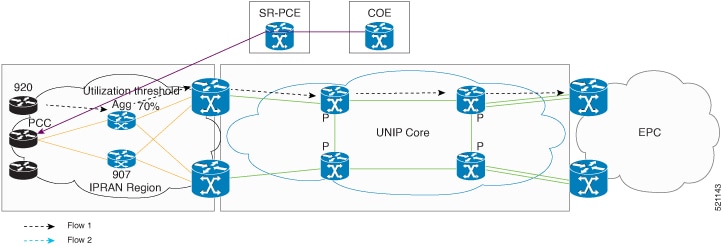COE-PCE Initiated SR Policy with OSPF Autoroute Announce
|
Feature Name |
Release Information |
Feature Description |
|---|---|---|
|
PCE Initiated SR Policy with OSPF Autoroute Announce |
Cisco IOS XE Bengaluru 17.4.1 |
This feature enables a steering mechanism in which IGPs automatically use the policy for destination's downstream of the policy end point. |
A PCE collects various pieces of network information to determine traffic flows causing link congestion. The PCE computes a suitable path to divert those flows and to alleviate the congestion. The PCE then deploys the SR-TE policy to divert the traffic leading to the congestion using the Stateful Path Computation Element Protocol (PCEP) to provision the policy. When the congestion is alleviated, the SR-TE policy is removed.
The PCEP message contains SID list to be deployed by the head-end. Path Computation Client (PCC) profiles allow activation of autoroute announce for the policy provisioned by PCEP, using the profile IDs. The profile ID on the PCE and PCC should match, otherwise the policy is not provisioned. For example, if the PCE provisions a policy with profile ID 1 and the head-end where the policy is being provisioned also has the PCC profile ID 1 configured with autoroute announce, COE-PCE initiated SR policy is activated for that policy.
COE-PCE Initiated SR Policy

The preceding topology shows how an SR-PCE policy is initiated from COE:
-
SR policy is configured on the COE with profile ID.
-
COE pushes the SR policy to PCE and PCE forwards the SR policy to PCC.
-
Profile ID on PCC is matched with the profile ID on COE-PCE.
-
OSPF autoroute announce is configured on the PCC.
-
The policy gets provisioned.
-
The data traffic now adheres to the SR policy that is pushed from the COE.
-
Complete SR Policy manipulation occurs only on COE.
Restrictions for PCE Initiated SR Policy
-
A maximum of 500 SR policies are supported.
-
Only native COE is supported.
-
Bandwidth optimization based on SR tactical policy is not supported.
-
Bandwidth optimization by using COE is not supported.
-
PIC core and PIC edge are not supported over SR-TE tunnel till Cisco IOS XE Cupertino Release 17.8.1. Starting with Cisco IOS XE Release 17.9.1, PIC core is supported for short LCM policies with 0, 1, or 2 SR labels.
-
ECMP over SR-TE is not supported.
-
6PE and 6VPE are not supported with three and four transport labels.
-
IPv6 is not supported.
-
A maximum of 10,000 VPNv4 prefix limits are supported.
-
BGP LU (RFC 3107) is not supported for intra-AS and inter-AS.
 Feedback
Feedback